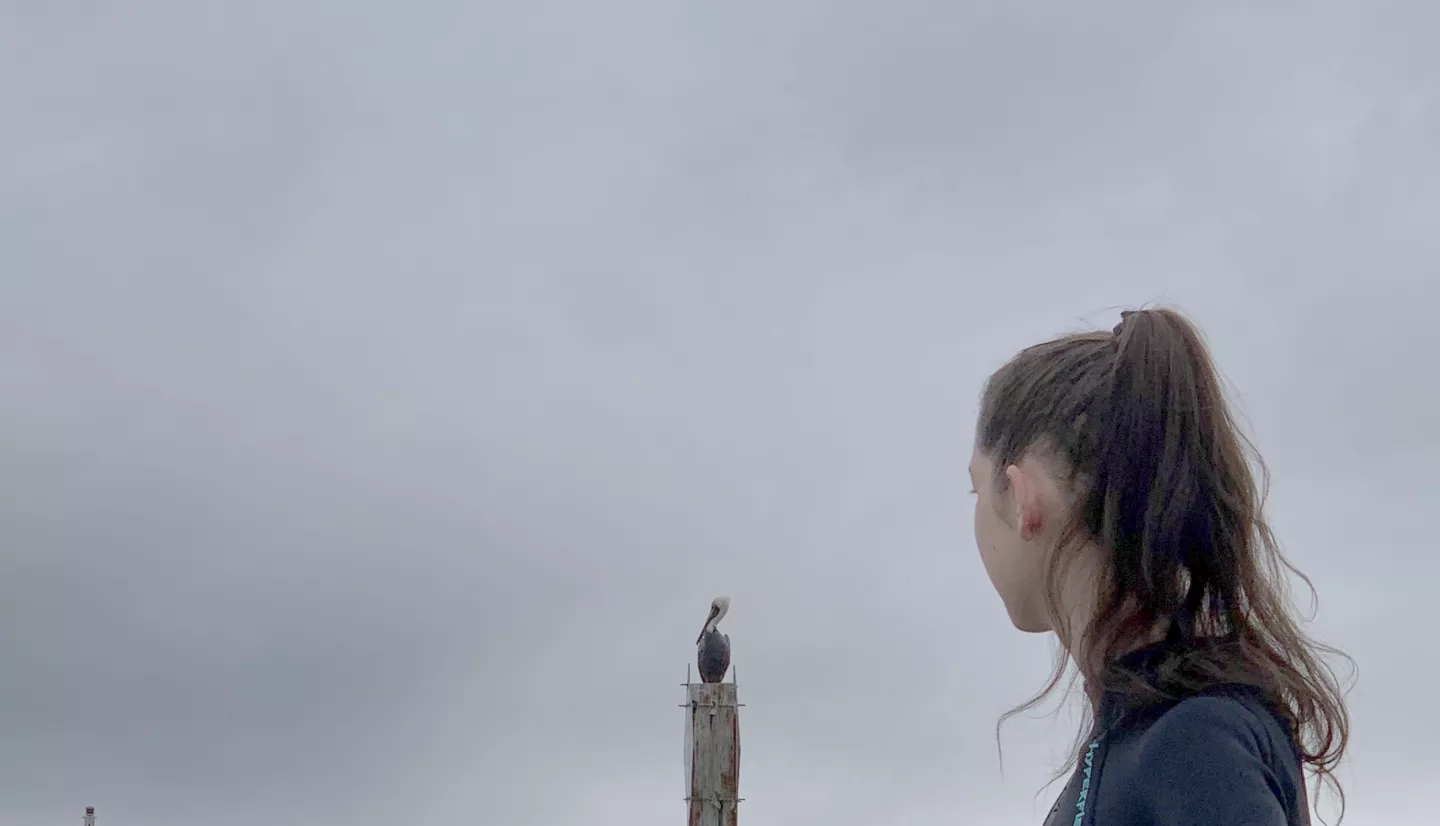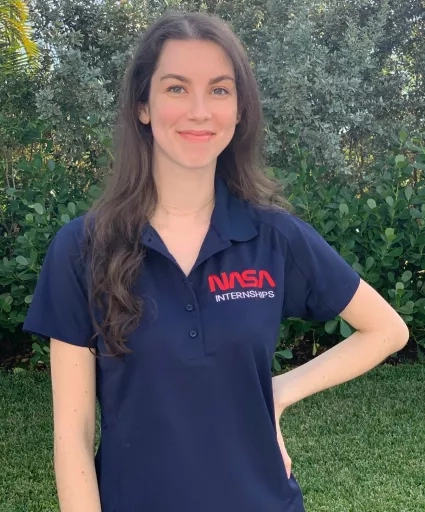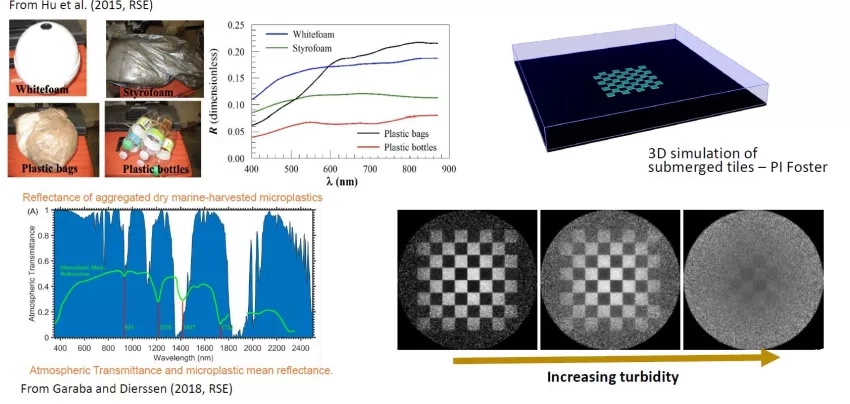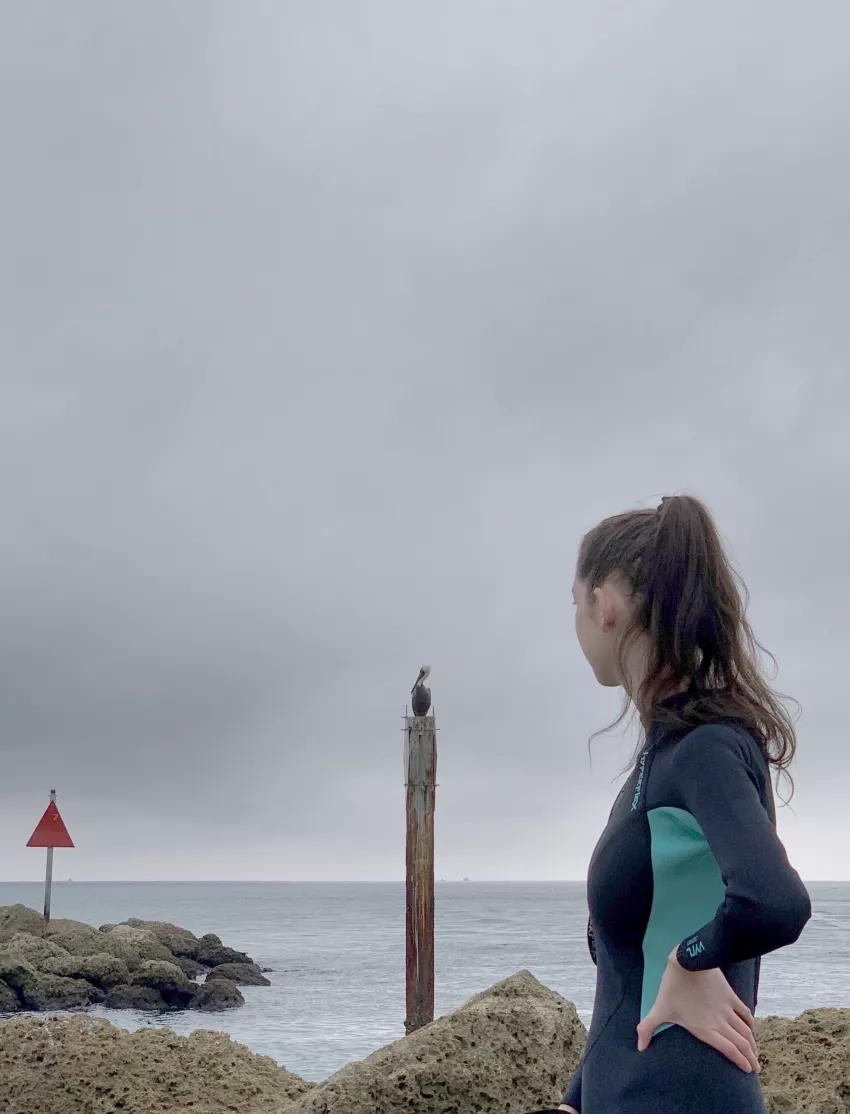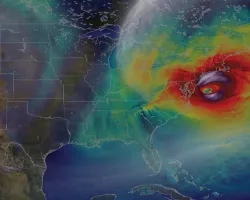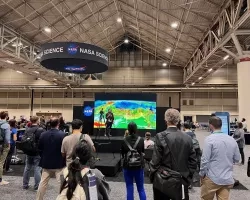Editor’s note: This article is the first in a series of profiles presented from the perspective of NASA interns and grad students. The intent is to provide opportunities to discover and understand the unique value of NASA’s diverse workforce through new lenses. For this story, NASA Applied Sciences Disasters Program Science Writer Intern and Western Washington University student, Carmen Atkins connected with Ashley Kleinman, an intern with NASA’s Ocean Biology & Biogeochemistry (OBB) program.
From the first moments of my interview with Ashley Kleinman, a NASA intern, I am moved by how contagious her ambition is. Kleinman is a sophomore at Harvard University, where she studies biology and physics. In the fall of 2020, she was one of only three interns to be awarded the Sally Ride scholarship. Even with such prestigious accomplishments, she immediately strikes me as both confident and humble. We promptly dive into a memory that sparked her earliest fascination with space. She laughs cheerfully, recalling a school field trip to NASA’s Kennedy Space Center when she was young: “I will never forget. I still have the little coin for the Mars Exploration Rover that commemorates it. I remember it just blew my mind that we have spacecraft and rovers that have explored other planets, and ever since then I just thought ‘wow, I want to do something in planetary science.’”
Kleinman has sustained a passion for exoplanets and astrophysics ever since, and she’s remained determined to build a career in planetary science. She even earned the nickname “Astro Ash” by her friends. Kleinman admits that her ultimate goal would be to become an astronaut, shyly admitting that many NASA interns must have same goal. As she eagerly points out the space posters and drawings on the wall behind her, it’s easy to picture Kleinman putting on a spacesuit in the future.
While Kleinman continues to look up to the stars, she also keeps a watchful eye on our own planet. Her upbeat voice wanes briefly as she recalls the importance of caring for our oceans that was instilled in her as a child growing up in Florida. Kleinman explains that spending her childhood near the ocean imparted her with an ever-present appreciation and concern for the environment. Her natural gravitation is towards science, and she quickly took up marine biology as a hobby. Still, it wasn’t until she completed an astronomy course in college that she realized it was possible to combine together her passions in Earth, biology, and planetary science through the study of extremophiles – organisms that thrive in extreme environments - and ocean worlds. Astrobiology intrigued and captivated her, leading to a whole new understanding of where life can survive. She lights up noticeably as she shares how fascinating extremophiles are to her and what they can teach us about life and habitability in the universe.
Kleinman’s Work at NASA
Last year Laura Lorenzoni, a Program Scientist for the Ocean Biology and Biogeochemistry Program (OBB) at NASA Headquarters, was searching for an intern to work on an assessment of the remote detection of marine debris. It’s no surprise to me that Kleinman was chosen for the position. Her passion for NASA, skills in both biology and physics, and care for our oceans make her a perfect fit. Her ability to communicate clearly and her enthusiasm about the importance of space exploration and ocean conservation is palpable. Using this ability, she breaks down the basics of marine debris, reminding me that the issue is a local, regional, national, and international concern. As an intern, Kleinman has wasted no time in identifying and compiling the main initiatives that currently exist to address the problem of marine debris. She’s analyzed the various initiatives and groups, looking for synergies between them as well as notable gaps between the groups where NASA may be able to step in and advance the work, especially through remote detection. As Kleinman speaks about her project, her professional tone remains enthusiastic, but clearly reflects her respect for the work. In addition to her work surrounding marine debris, she is currently working with Lorenzoni and the Network for Ocean Worlds (NOW) on a white paper entitled “Oceans Across the Solar System,” in which Kleinman develops synergistic research questions and collaborations between Earth and Planetary ocean sciences to advance research related to ocean worlds.
This fall, with an extension of her internship, Kleinman has continued to link initiatives together from different agencies, such as the European Space Agency (ESA) and the U.N., to work on fostering better communication and action for the tracking and mitigation of marine debris internationally. Kleinman reveals that it’s difficult to remotely detect marine debris, but it is crucial to do so. Mitigation is only possible if the location and movement of marine debris are known. She also works with NASA’s Earth Applied Sciences Disasters Program, studying major debris events such as the wreckage left in the wake of hurricanes or landslides. She expresses her appreciation for the high level of international collaboration she’s seen in her work with NASA’s OBB program and Disasters Program, remarking “Especially for marine debris; it’s definitely a systemic issue; it affects everyone in the world, and so it’s important that we work together.”
On Being a NASA Intern
When I ask Kleinman about her experience as a whole, she beams about the people at NASA: “No matter how busy they are, they’ll always take time to speak to an intern, and I think that’s so cool. Your voice is heard at NASA. They really are genuinely interested in what an intern has to contribute.” She’s taken full advantage of the unique position that NASA interns have by reaching out to scientists and other NASA employees for advice. Her biggest reminder to interns and future interns? “Don’t be afraid to reach out to people; and take chances, because you never know where it will lead.”
Despite Kleinman’s confidence and success, she confides that she’s had to overcome the challenge of finding the courage to speak up as an intern. Coming from such a well-spoken, enthusiastic individual, that’s difficult for me to picture but is something that many people can relate with, especially interns. She’s quick to acknowledge that her mentors have played a large part in her growth. One notable way they’ve displayed their own confidence in Kleinman has been through the responsibilities they offer her. That vote of confidence has given her greater assurance in her ability to contribute to NASA’s work in meaningful ways. She tells me that she feels honored to have the responsibilities she’s been given, such as representing NASA at certain large meetings. She says it still feels surreal when she’s called on to speak.
Looking Ahead
As we turn to her future goals, Kleinman describes her central career focus: to become a microbiologist and study extremophiles. This combines her interests in Earth and planetary science. “I’m really interested in taking what we can study about our own oceans and then applying it to the icy outer moons of the solar system, or the water world exoplanets,” she remarks. I also ask Kleinman about other interests or hobbies. She contemplates the question for a moment and admits that it’s a challenge to think of something that’s not STEM-related. She mentions scuba diving, which she’s become involved in since her summer internship studying marine debris. She also brings up her interest in video editing, something she’s enjoyed since high school. On the side, she’s working with another NASA intern on a new NASA @ Work video. Kleinman’s hobbies and interests seem to overlap in unique ways.
Almost as an afterthought, Kleinman mentions one more interest of hers that catches my attention. She asks if I’ve ever heard of the term “The Overview Effect.” I tell her that I’m not sure if I have, but she’s happy to share. She notes that it’s not exactly something one might call a hobby, but it’s a concept she’s passionate about, nonetheless. She tells me “The Overview Effect” is a term coined by the writer Frank White. The phrase comes from the cognitive shift that occurs in a person’s overall awareness after seeing the Earth from outside its atmosphere, for example, from the vantage point of the International Space Station. The effect leads most people to see both the fragility of our planet from outer space and the interconnectedness between all people, as political borders disappear from such a vantage point. She shares with me how this concept motivates her. It’s clear to me that it connects deeply with her goal to become an astronaut. It’s also evident that she recognizes the value of such a shift in perspective that can motivate others into taking better care of the Earth. “Sometimes people view protecting the environment and space exploration as two different things,” she says. “Bringing that together through the overview effect is something I’m super passionate about.” Even this early in her career, it’s unmistakable that Kleinman has a strong grasp on the importance of NASA’s work and how people can be inspired to care for our planet. Her own work with NASA is already contributing to that goal.
